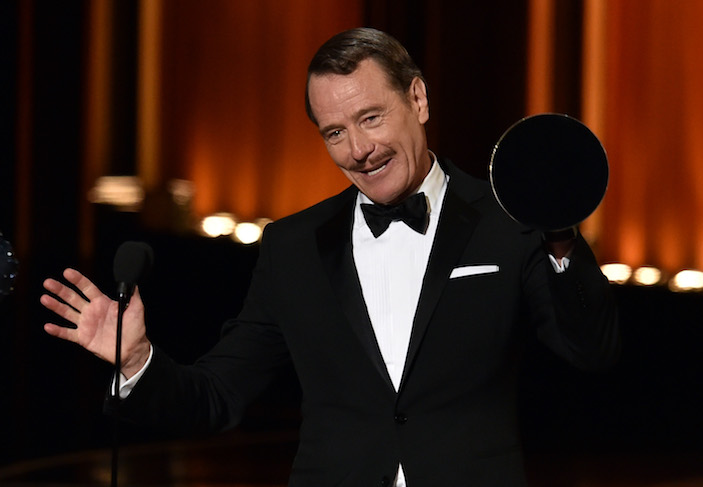There is a restaurant on the stage at the National Theatre in London. It is called Foodwork, and it is part of the set of Network, an adaptation of Paddy Chayefsky’s 1976 masterpiece about a news anchorman called Howard Beale who goes mad and is given a new show — The Howard Beale Show — to preach the gospel of despair. If you think this sounds dull, imagine Huw Edwards threatening suicide after an item about ducks. Beale is played by Bryan Cranston — Peter Finch in the film — and the restaurant will close when the run ends. Ephemera, then; chase the art, chase the cake.
I do not know why they built a restaurant here; some critics have complained that the set, which is Foodwork and a television studio, is too noisy: an oddity, a mistake. I cannot possibly judge it as a restaurant but I can say that I have not had a more glorious night anywhere.
You enter through a gap in immense concrete walls. The National Theatre does not know if it is a spaceship or a pre-medieval castle, but it has come to terms with it and is the only modernist building I have ever loved. Perhaps it is the carpeting: soft, blue, big government at its most benevolent, buying rugs. That will not come again.
You are led on to the stage, and into a restaurant staffed by people so poised they must be actors. There is a long cocktail bar, and tiny tables; blue sofas, a polished floor. It is a renovated Le Caprice on a stage. We are dressed in black, as directed, and we watch the rest of the audience come in. Then the show plays around us. Beale and his friend Max drink at the bar, and this is filmed and played on to the television screen on the stage; Max and his lover Diana eat, and have workaholic sex. The expressions of the diners are tossed onto the screen. Only calm stares work. Giggles do not.
As this happens, we eat: butternut squash with shallots; a crab cocktail; sticky short rib and ox-cheek bourguignon; sorbet sprayed with gin; Black Forest gâteau. It is good but not marvellous, but it is not the point, because I can barely eat. Network is my favourite film of the 1970s, and Cranston is as good as Peter Finch; no, he is better, because he is more heartsick. If you turn your head towards the auditorium, you are dazzled by lights.
I am in the audience of The Howard Beale Show at last; I am required to scream: ‘I’m mad as hell and I just can’t take it any more!’ That I am also in an expensive restaurant whose seats were allocated by ballot is an irony, and possibly a mistake. This is no place for revolution.
Cranston delivers the famous speech on the evils of television. He is an actor of immense grace and tenderness, and he understands television; Breaking Bad, in which he played a shy chemistry teacher who became a crystal meth dealer, and loved it, made him world-famous. As he begs us to turn off the television and go to our gods, ‘Go to yourselves’, he walks behind us and touches my arm and my companion’s arm, and looks at us with terrible sorrow and compassion. This is not my usual experience in Le Caprice, or any lookalike Le Caprice. They exist to deny such feeling, to push it down with bread baskets and silver fittings; with false love.
Shortly afterwards he is murdered, because he had poor ratings. He bled out on the stage ten feet away like Christ. So I couldn’t really eat. But Foodwork isn’t really a restaurant, and Bryan Cranston isn’t really Howard Beale. All this aside, I wept.







Comments